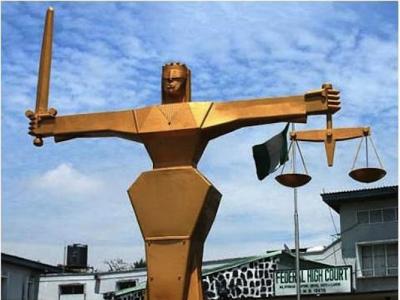The Federal High Court, Abuja, on Wednesday, granted an Abuja-based lawyer, Mr Oladimeji Ekengba’s application to institute a suit over the delay in appointment of the 33 nominees recommended to him by the National Judicial Council (NJC) as judges of the High Court of the Federal Capital Territory, Abuja.
Ekengba had, in an ex parte application brought before Justice Inyang Ekwo, asked the court to grant his prayer, seeking an order of mandamus to compel the president to appoint all the nominees as judges as recommended by the NJC.
While the President, Federal Republic of Nigeria is the 1st respondent, the Attorney-General of the Federation is the 2nd respondent in the application.
An applicant is required to seek and obtain the leave of court, otherwise referred to as the permission of court, before filing the main suit seeking an order of mandamus to compel the president or any public officer to carry out an official duty.
President Buhari in April, appointed 11 of the nominees on the NJC’s list sent to him, but the remaining 21 are yet to be appointed.
Ekengba had insisted in his ex-parte application filed in July this year that the president was duty-bound to appoint all the 33 nominees by virtue of Section 256 (2) of the Constitution.
Ruling, Justice Ekwo held that the applicant placed sufficient materials before the court to warrant granting him the permission to pursue the suit.
“I am satisfied that he has placed sufficient materials of persuasive value before this court”.
He, however, noted that granting permission to the applicant to take an action “is not the action itself”.
“I, therefore, grant leave to the applicant to seek an order of mandamus directing and/or compelling the President to act on the recommendation of the National Judicial Council by appointing thirty-three persons as honourable judges of the High Court of the FCT, pursuant to Section 256 (2) of the Constitution of the Federal Republic of Nigeria, 1999 (as Amended)”.
Justice Ekwo had, in September, ruled in another suit filed by Ekengba that the president acted in contravention of the law when he sent the names of 11 persons recommended to him by the NJC to the Senate for screening and confirmation.
The judge agreed with the plaintiff that only the appointments of a head of court, like the Chief Judge, required Senate confirmation.
Alleged Delay in Judges’ Appointment: Court Okays Lawyer’s Plea to Institute Suit
- Advertisement -
- Advertisement -
- Advertisement -
- Advertisement -
- Advertisement -

